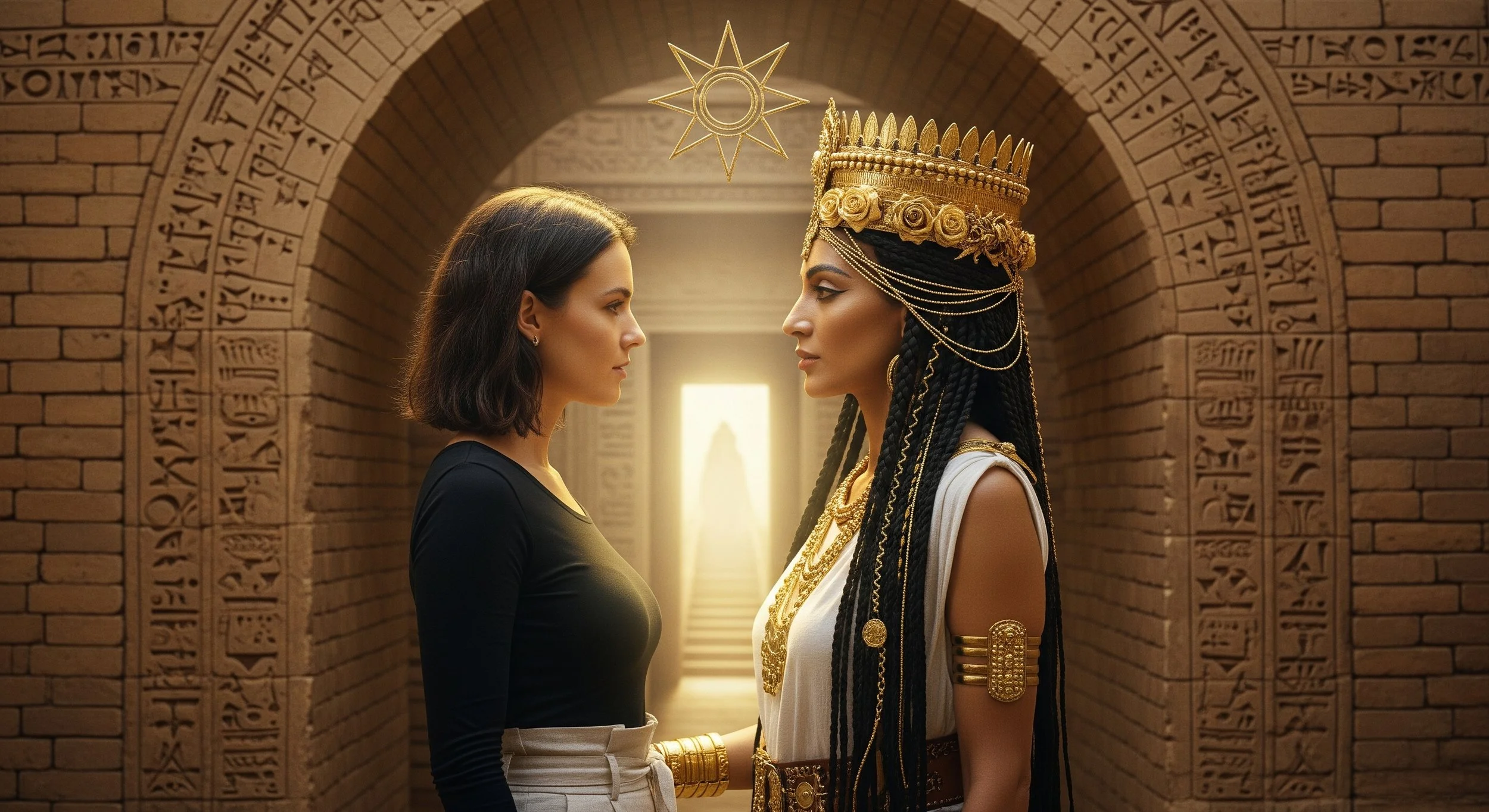Why Ancient Feminine Myths Hold the Key to Modern Women’s Wholeness
Modern woman meets Inanna — a symbolic encounter between contemporary life and the oldest feminine myth of descent and renewal.
In a world that prizes speed, productivity, and constant achievement, many women (and men!) find themselves quietly exhausted, successful on the outside but disconnected on the inside. This is not a personal failing; it is the inheritance of 5,000 years of patriarchal conditioning that has celebrated the mind while exiling the body’s wisdom. The oldest known myth alive today, an ancient Sumerian story of a goddess’ descent to the underworld, offers a map back to wholeness for modern women (and men). It invites us to shed the roles and defences that once kept us safe, guiding us through the underworld of shadow, grief, and lost instincts, eventually into a fuller, more embodied self.
This descent to the underworld is not unlike the inner journey many modern women, and some men, experience. It often appears as burnout, crisis, or an unshakable sense that something is missing. These thresholds can feel like the undoing of everything we have built, yet they hold the potential for profound transformation. When we approach them not as problems to solve but as initiations, we begin to reclaim the parts of ourselves we abandoned to survive. Here, ancient wisdom meets modern psychology in the recognition that true wholeness is not found by transcending the body or bypassing pain, but by moving through it, fully awake and rooted in our own truth.
The Myth of Descent: A Forgotten Map
The ancient myth tells of Inanna, the Sumerian goddess of heaven and earth, who descends into the underworld to meet her dark sister, Ereshkigal. At each of the seven gates, Inanna is stripped of her power, her jewels, her garments — everything she once identified with. Naked and humbled, she faces death, dismemberment, and the terrifying forces of the unconscious. Only by surrendering fully does she eventually return, renewed and more whole than before.
This story is more than an old tale. It is a mirror of the psyche’s deepest process of transformation: the stripping away of masks, the confrontation with shadow, and the rebirth into a fuller self.
For women today, who often grow up as daughters of the patriarchy — valued for achievement, intellect, and adaptation to masculine structures — this descent carries particular medicine. Many of us have lost connection to instinct, body, and feminine knowing. We have inherited the belief that success means being “good daughters of the father,” suppressing parts of ourselves deemed too wild, too emotional, too much. Inanna’s descent reminds us that these exiled parts live on in the underworld, waiting to be reclaimed.
The Cost of Avoiding Descent
Modern culture teaches us to bypass the descent. We are told to stay positive, to meditate away our grief, to rise above our anger. Even much of spirituality echoes this patriarchal pattern: transcend the body, silence the instinct, aim only for the higher chakras, higher frequencies.
But when we bypass the underworld, the unlived life does not disappear. It waits. It leaks out as depression, emptiness, anxiety, chronic fatigue, or the haunting sense of not being fully alive.
Inanna’s story shows us another way. Wholeness does not come by escaping darkness but by walking through it, accompanied, resourced, and with the courage to meet what has long been denied.
A Modern Initiation
For modern women, the descent often begins as a crisis:
Burnout after years of striving.
A health collapse that forces slowing down.
The end of a relationship that held up an identity.
A sudden loss of meaning in work or life.
These thresholds can feel like failures, but in the symbolic language of the psyche, they are gateways to the underworld. Each loss, each stripping away, is an initiation.
The descent is not about abandoning the life we have built, but about letting go of the false layers so we can return with something truer. Inanna does not stay underground forever. She returns — but she is not the same. She has integrated the wisdom of her dark sister and reclaimed her full power, both light and shadow.
Reclaiming the Forgotten Feminine
To live whole, we need to bring back the forgotten feminine:
The wisdom of the body.
The truth-telling of grief and anger.
The instinctual energy that knows how to set boundaries, say no, and protect what is sacred.
The creativity and eros that come alive when we are rooted in ourselves.
This is the medicine our culture desperately needs. And it begins with each of us turning inward, daring to descend, and reclaiming what has been buried in exile for generations.
Walking the Path Together
Individuation, in Jung’s terms, is the process of becoming whole — integrating all parts of the psyche, not just the ones that look good in the daylight. For modern women, individuation requires a descent into the forgotten feminine, into the body, into shadow. It is not a solitary task; the underworld is too heavy to walk alone. We need guides, companions, and spaces where descent is honored as a sacred initiation, not a pathology.
This is the vision behind my course Back to Me: The Modern Woman’s Journey to Wholeness. Inspired by the ancient Sumerian myth of descent to the underworld, and grounded in depth psychology, body-based practices, and neuroscience, it offers women a path to shed the masks of adaptation and rediscover the truth of who they are.
Conclusion
The world tells us to rise, to transcend, to move faster. But the soul whispers a different truth: descend, slow down, reclaim. Ancient myths like Inanna’s are not relics of the past; they are living maps for our time. They remind us that the way back to ourselves is not by escaping what hurts, but by meeting it — fully, tenderly, and with the courage to be remade.

